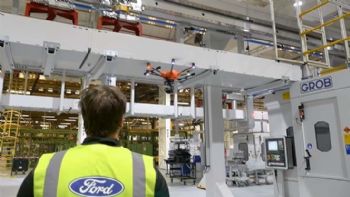
Technology is evolving rapidly – each week there seems to be new products coming on to the market to challenge the way companies carry out their business — but this also gives them the opportunity to become more productive and cost-efficient.
Computer systems, such as Customer Relationship Management systems (CRMs), are helping with the planning of workloads, ensuring the journey through the factory is as smooth and efficient as possible, while advanced analytics can keep track of components from inception through to delivery.
Here, with Ford servicing specialists, (
Lookers), we explore some of the innovative ways in which technology has improving the production process at the leading automotive manufacturer.
DronesIn its Dagenham engine plant, Ford has started to use drones to help perform risky inspections of the factory’s equipment.
The company is benefitting massively, saving almost 12 hours on each inspection and reducing the time it takes to check the equipment from 12 hours to 12 minutes.
Not only can drones provide a quick and thorough inspection, but they eliminate the health and safety risk of someone needing to scale up to 150ft to look at gantries.
As well as making sure the equipment is still in a good enough condition, the drones are providing the company with video and still footage that can be stored to allow the plant to compare its findings over a period of time to monitor any changes or patterns that are noticeable.
This has become an indispensable tool for the factory, with the drones greatly improving productivity and efficiency.
BodysuitsFord’s Michigan plant is also using innovative technological developments to assist its workforce.

It was announced in 2017 that line workers in the plant would pilot exoskeleton suits — wearable technology that can help support a worker’s arms while they undergo tasks above their heads.
These suits can also be adjusted to support different weights, depending on the wearer’s needs.
While such suits were more likely to appear on the big screen in movies such as Iron Man just a few years ago, the creation is having positive feedback from its users, with many claiming they aren’t as sore after a shift if they’ve been wearing an exoskeleton suit.
Industrial stairsIndustrial stairs come in various sizes, styles, and types, depending on the users requirements. They are a key ingredient in making spaces and floors more accessible for faster and more-efficient
manufacturing workflow. Manufacturers use computer-aided design (CAD) generators to
design and download CAD models of industrial stairs, crossovers, and platforms. They also
use the latest CNC machinery to ensure precision and accuracy.
3-D printingWhile it’s still early days for 3-D printing, it has the potential to have a massive impact in the future.
It is expected to impact nearly all areas of manufacturing as it changes how companies will do business and will impact material costs, the traditional assembly line and product pricing strategies.
Automated printers, like those used by New York-based Voodoo Manufacturing, don’t need to be manned anymore and can continue working 24-hours-a-day.
Embedded metrologyThe process of quality control can traditionally be a very time-consuming and expensive project.
There would be randomly selected machine-made parts that would be individually tested, and if they passed the test, the batch it came from would be validated.
However, of course, this process can’t be too reliable, as faulty parts may well be produced in a batch and slip through after the checks.
That’s why the ever-improving embedded metrology will continue to help manufacturers produce a better product. This quick and convenient solution is a lot more accurate and requires little human interaction.
In the future, it’s anticipated that this human aspect can be removed completely, with technology helping to provide a fully integrated and fully automated form of quality control.
The truth is, technology is continuing to amaze us in all areas of life.
While there are concerns that jobs will be lost as technology keeps progressing, it can only be a good thing for manufacturing companies as it continues to help improve productivity and efficiency and if anything could lead to companies expanding and creating more wealth and jobs in the longer term.
Sources:
www.cnbc.com/2018/08/31/ford-is-using-drones-to-keep-an-eye-on-its-factories.htmlwww.thedrive.com/sheetmetal/15921/exoskeletons-unveiled-at-ford-manufacturing-plant www.matrixrecruitment.ie/5-innovative-technologies-solve-manufacturing-problems-2018